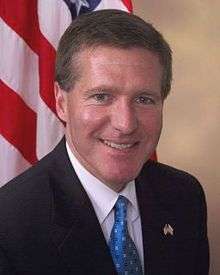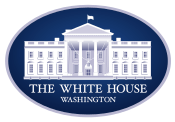Kenneth L. Wainstein
| Ken Wainstein | |
|---|---|
 | |
| 4th United States Homeland Security Advisor | |
|
In office March 30, 2008 – January 20, 2009 | |
| President | George W. Bush |
| Preceded by | Fran Townsend |
| Succeeded by | John Brennan |
| Assistant Attorney General for National Security | |
|
In office September 28, 2006 – March 30, 2008 | |
| President | George W. Bush |
| Preceded by | Position established |
| Succeeded by | Patrick Rowan |
| United States Attorney for the District of Columbia | |
|
In office May 2004 – September 28, 2006 | |
| President | George W. Bush |
| Preceded by | Roscoe Howard |
| Succeeded by | Ronald Machen |
| Personal details | |
| Born |
Kenneth Leonard Wainstein 1962 (age 55–56) |
| Political party | Republican |
| Education |
University of Virginia (BA) University of California, Berkeley (JD) |
Kenneth Leonard "Ken" Wainstein (born 1962) is an American lawyer.[1] He served as the first Assistant Attorney General for National Security, and later as the Homeland Security Advisor to United States President George W. Bush.
Education
Wainstein is a graduate of the University of Virginia and earned his law degree from the University of California at Berkeley.[1]
Career
Wainstein worked for the Federal Bureau of Investigation, as General Counsel and as Chief of Staff to the FBI Director.[1] He was United States Attorney for the District of Columbia.[1]
On September 26, 2006, he was sworn in as the Department of Justice's Assistant Attorney General responsible for National Security.[2]
Wainstein was appointed Homeland Security Advisor by President George W. Bush on March 30, 2008. He was also Assistant to the President for Homeland Security and Counterterrorism and chaired the Homeland Security Council. He was appointed as the "National Continuity Coordinator" under the auspices of National Security Presidential Directive 51.[3]
Wainstein also serves as a member of the Blue Ribbon Study Panel on Biodefense, a group that encourages and advocates changes to government policy to strengthen national biodefense.[4] In order to address biological threats facing the nation, the Blue Ribbon Study Panel on Biodefense created a 33 step initiative for the U.S. Government to implement. Headed by former Senator Joe Lieberman and former Governor Tom Ridge, the Study Panel assembled in Washington D.C. for four meetings concerning current biodefense programs. The Study Panel concluded that the federal government had little to no defense mechanisms in case of a biological event. The Study Panel's final report, The National Blueprint for Biodefense, proposes a string of solutions and recommendations for the U.S. Government to take, including items such as giving the Vice President authority over biodefense responsibilities and merging the entire biodefense budget. These solutions represent the Panel's call to action in order to increase awareness and activity for pandemic related issues.
References
- 1 2 3 4 "Kenneth L. Wainstein Sworn in as First Assistant Attorney General for the National Security Division: Other Senior National Security Division Officials Announced". United States Department of Justice. 2006-09-26. Retrieved 2009-03-17.
- ↑ "Official Bio". Retrieved October 25, 2011.
- ↑ "NATIONAL SECURITY PRESIDENTIAL DIRECTIVE 51". Retrieved October 25, 2011.
- ↑ "Blue Ribbon Study Panel on Biodefense". www.biodefensestudy.org. Retrieved 2017-03-31.
| Political offices | ||
|---|---|---|
| New office | Assistant Attorney General for National Security 2006–2008 |
Succeeded by Patrick Rowan |
| Preceded by Fran Townsend |
United States Homeland Security Advisor 2008–2009 |
Succeeded by John Brennan |
